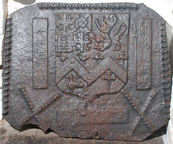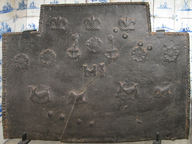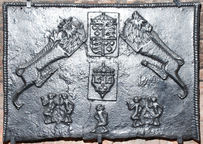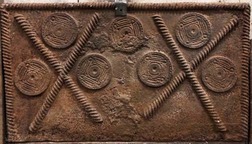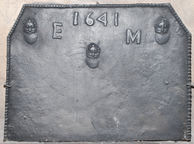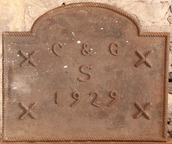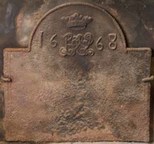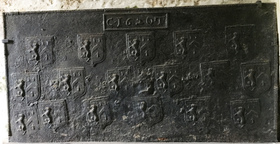-
334
Description: Quasi-rectangular; twisted rope lengths along top and sides; centre top, quartered shield between two vertical carved stamps of a billet with five oval shapes; the same billet is repeated horizontally below between two irregular twisted rope saltires.
Notes: The arms are probably of Thomas Wriothesley, who was Henry VIII's last Lord Chancellor and created Earl of Southampton in 1547; he married c.1533 so the arms could date to before then, but the same arms are displayed on his enamelled stall plate in St George's Chapel, Windsor, of 1545, and in stained glass in a window in the parish church at South Warnborough, Hampshire. The shield is, quarterly, 1. Wrythe or Wriothesley quartering Dunstanville and Pink, 2. Drayton, 3. Crocker and 4. Peckham. A candidate for the earliest English fireback with an example of personal arms. A similar fireback is no. 1305.
Arms: Wriothesley (Earl of Southampton)
- Decoration tags:
- rectangular (shape)
- rope (edging)
- simple stamps
- carved stamps
- armorial
- objects
Manufactured: in the mid- to late-16th century in the Weald area of England.
Current location: in private hands, Huddington, Worcestershire, England.
Citation: Gardner, J. S., 25 May 1907, 'Old Wealden Ironwork at Warnham Court', Country Life, pp. 730-2.
- Attached to series:
- Personal armorial firebacks
- Royal series
- Wriothesley firebacks
-
942
Description: Rectangular with a central rectangular extension; twisted rope edging; fleur-de-lys stamp with twisted band repeated three times at top; ?rose stamp repeated five times in line below fleurs, some over pressed, central rose above others; cabled anchor stamp repeated twice, either side of central rose; initials below central rose; ?cow and dog stamps each repeated twice alternately in line below initials; eight rivets from later repair.
Notes: None of the stamps is known from any other fireback; cabled anchor may suggest a connection with a seaport.
Inscription: HI
- Decoration tags:
- rectangular with square arch (shape)
- rope (edging)
- simple stamps
- carved stamps
- individual letters
- heraldic
- text
- animals
- plants
- objects
Manufactured: in the early-17th century in England.
Current location: Wilberforce House, High Street, Kingston upon Hull, Yorkshire, England.
(part of the Hull Museums museum group)
- Attached to series:
- Miscellaneous stamp firebacks
- Fleur-de-lys firebacks
-
347
Description: Rectangular; twisted rope edging (top and sides); central Tudor shield, garter, crown and supporters (greyhound and lion), formed from separate stamps; date on a single stamp in top left corner.
Notes: The worn appearance of the central arms, compared with the clarity of the date, suggests that this is an early example of a fireback being used as a pattern, with the addition of a subsequent date. The same stamps forming the arms can also be seen on other firebacks. The extension of the lower part of the ‘3’ on the date stamp suggests that the numbers may have been fixed to the backing block, rather than the date being carved as a whole. Another variant of this fireback (no. 1041) has the rope edging extending only three-quarters of the way down the sides.
Inscription: 1583
Arms: Tudor royal (prob. Elizabeth I)
- Decoration tags:
- rectangular (shape)
- rope (edging)
- carved stamps
- date stamp
- armorial
- royal
- text
Manufactured: in the late-16th century in the Weald area of England.
Current location: Ightham Mote, Ightham, Kent, England.
Museum number: 825358 (part of the National Trust museum group)
-
345
Description: Rectangular; twisted rope edging (top and sides); from top, crowned Tudor royal shield (stamp overpressed) above crowned shield bearing initials, KH in Lombardic lettering, above a fleur de lys (stamp overpressed); to left, diagonal lion passant guardant sinister; to right, diagonal lion passant; at base, single 'imp' figure, arms to side, moving left but facing right, between two pairs of 'imp' figures (separately stamped), one moving left, right arm raised, the other moving right, right arm raised.
Notes: One of the 'Royal' series.
Arms: Tudor royal arms of England
- Decoration tags:
- rectangular (shape)
- rope (edging)
- carved stamps
- heraldic
- armorial
- animals
- humans
Manufactured: in the mid-16th century in the Weald area of England.
Current location: Ightham Mote, Ightham, Kent, England.
Museum number: 825393 (part of the National Trust museum group)
- Attached to series:
- Royal series
-
1118
Description: Rectangular; twisted rope edging (top and sides); initials in top corners; below the initials, a saltire formed of possibly two straight lengths of twisted rope.
Notes: The saltire is likely to have an apotropaic purpose; the hollows in the risers of the letter 'H' and the end of the left line of the saltire may have been formed by gas bubbles in the molten iron during casting.
Inscription: N H
- Decoration tags:
- rectangular (shape)
- rope (edging)
- simple stamps
- individual letters
- apotropaic
- text
Manufactured: in the early- to mid-17th century in England.
Current location: in private hands, Isleworth, London, England.
- Attached to series:
- Rope design firebacks
-
1172
Description: Rectangular; twisted rope edging (top and sides); to each side, two saltires formed of crossed lengths of twisted rope; in between, and repeated seven times, a circular stamp decorated in low relief with a central disc perforated in the centre, surrounded by a circle inside a square looped at each corner, the sides of which are echoed twice on each side; the stamps are arranged in two rows, of three and four, in the upper part of the plate.
Notes: A boldly cast fireback with an excrescence top centre caused by disturbance of the casting sand by the pouring of the iron.
- Decoration tags:
- rectangular (shape)
- rope (edging)
- simple stamps
- carved stamps
- apotropaic
- objects
Manufactured: in the late-16th to early-17th century possibly in the Weald area of England.
Current location: Retrouvius, 1016 Harrow Road, Kensal Green, Brent, London, England.
- Attached to series:
- Food mould stamp firebacks
- Rope design firebacks
-
356
Description: Canted rectangle; twisted rope edging (top and sides); bearded face stamp repeated in top corners and below inscription; date along top edge; initials split by date and slightly below.
Notes: The distinctive style of the ‘4’ in the date and the bearded mask stamp have also been noted on a fireback at Callow Farm, Dymock, Gloucestershire, associated with the operator of the Newent furnace.
Copies of this fireback are known.
Inscription: E 1641 M
- Decoration tags:
- rectangular with canted top corners (shape)
- rope (edging)
- carved stamps
- individual letters
- individual numbers
- text
- humans
Manufactured: in 1641 probably at Elmbridge Furnace, Newent in the Forest of Dean area of England.
Current location: Baddesley Clinton Hall, Knowle, Warwickshire, England.
Museum number: 342876 (part of the National Trust museum group)
- Attached to series:
- Miscellaneous stamp firebacks
-
1156
Description: Arched rectangular shape; stylised twisted rope edging; centred, 'C & G' above 'S' above '1929', all between four stylised rope saltires.
Notes: A twentieth century fireback designed and executed in a traditional form.
Inscription: C & G / S / 1929
- Decoration tags:
- rectangular with round arch (shape)
- rope (edging)
- carved stamps
- individual letters
- individual numbers
- text
- objects
Manufactured: in 1929 in England.
Current location: Lacock Abbey, Lacock, Wiltshire, England.
Museum number: 1545478 (part of the National Trust museum group)
- Attached to series:
- Rope design firebacks
-
1225
Description: Arched rectangular shape; twisted rope edging (top and sides); in arch, marquess's coronet above a monogram with date split either side.
Notes: The elaborate monogram has not been deciphered, but the fireback does not appear to be related to the Talbot family who owned Lacock throughout the 17th century.
Inscription: 16 [undeciphered monogram] 68
- Decoration tags:
- rectangular with round arch (shape)
- rope (edging)
- whole carved pattern
- individual numbers
- heraldic
- monogram
- text
Manufactured: in 1668 in England.
Current location: Lackock Abbey, Lacock, Wiltshire, England.
Museum number: 996713 (part of the National Trust museum group)
- Attached to series:
- Miscellaneous pattern firebacks
-
361
Description: Quasi-rectangular; twisted rope edging on top and sides; cavetto-moulded-edged rectangle top centre, enclosing date between initials; 17 shields of Ayloffe impaling Sulyard in three rows (5-6-6); Ayloffe: sable, a lion rampant Or, collared gules, between three crosses formy of the second; Sulyard: argent, a chevron gules between three pheons inverted sable.
Notes: William Ayloffe (c1535-1584) of Bretons, Hornchurch, Essex, Justice of the Court of Queen’s Bench, married (c1560) Jane, dau. of Sir Eustace Sulyard, of Runwell, Essex. The initials 'CT' are likely to be those of Charles Tyler, a founder whose working life and that of his family have strong parallels with the occurrence of these firebacks.
Inscription: C.1.6 2.0.T
Arms: Ayloffe impaling Sulyard (William Ayloffe of Bretons, Hornchurch)
- Decoration tags:
- rectangular (shape)
- rope (edging)
- carved stamps
- individual letters
- individual numbers
- armorial
- text
Manufactured: in 1620 possibly at Hawkhurst Furnace in the Weald area of England.
Current location: Scotney Castle, Lamberhurst, Kent, England.
Museum number: 791898 (part of the National Trust museum group)
- Attached to series:
- Ayloffe series
- Personal armorial firebacks
